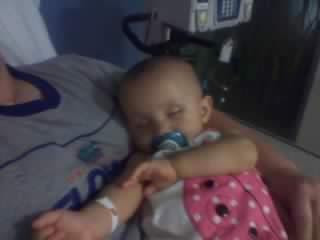
Lia is experiencing some of the side effects the doctors warned us about. She is very tired, and looks pale now. Her hair is very thin, and every time we bathe her she looses a little more. She gags and spits up, but thankfully that has only been within 2 days of the chemo so she isn’t getting sick all the time. She has broken out in a rash around the chemo port implant, but the rash does not seem to bother her much. Before each chem. Treatment, Lia has to have blood work done. Her counts have started to show up low – both her white blood cells (neutropenia) and her platelets (thrombocytopenia). If these numbers go too low, Lia can’t have the chemo treatment until the levels are above the minimum required. Different chemo drugs have different side effects, or can cause different types of side effects in individuals. In Lia’s case, she is experiencing diarrhea. This is a concern because the chemo drugs can cause dehydration as it is. In serious cases, the doctor may prescribe a medicine to control the diarrhea. If your child’s diarrhea has been very severe, the doctor will put the child on oral re-hydration therapy to replace the water and important electrolytes lost. We are keeping a lot of Pedialyte around to make sure Lia’s stays hydrated. We have also noticed that Lia is experiencing pain in her feet and legs. This is called neuropathy. Neuropathy is nerve damage or disease. It may cause pain, numbness, tingling, difficulty controlling the muscles, or other problems. If Lia’s red blood count goes too low, she will have to have blood transfusions to return the red blood cell count to normal levels. Lia is also not eating the same foods she used to love. The chemo drugs can cause a bitter or metallic taste, so that is probably why she is changing what she likes to eat. Lia will also be having hearing tests performed, because one of the drugs, called Carboplatin, can sometimes cause hearing loss. The other drug Lia is taking is called Vincristine.
Vincristine has many side effects such as severe allergic reactions (rash; hives; difficulty breathing; tightness in the chest; swelling of the mouth, face, lips, or tongue); cough or sore throat; fever or chills; hearing changes or loss of hearing; mouth sores; muscle weakness; numbness or tingling of your fingers or toes; pain in the bones, muscles, or jaw; pain, redness, or swelling at the injection site; seizures; stomach pain; trouble urinating; unusual bruising or bleeding; vision changes or loss of vision.
The side effects of Carboplatin are Low blood counts (including red blood cells, white blood cells and platelets), Nausea and vomiting usually occurring within 24 hours of treatment, Taste changes, Hair loss, Weakness, Blood test abnormalities: Abnormal magnesium level, Burning sensation at the injection site, Abdominal pain, Diarrhea, Constipation, Mouth sores, Infection, Peripheral neuropathy. These side effects may become progressively more severe with continued treatment. Hearing loss (ototoxicity) - loss of high pitched sounds, Abnormal blood electrolyte levels (sodium, potassium, calcium), Abnormal blood liver enzymes (SGOT, Alkaline phosphatase) (see liver problems), Cardiovascular events. Although infrequent, heart failure, blood clots and strokes have been reported with Carboplatin use.





































